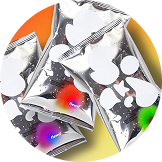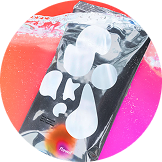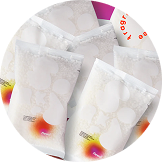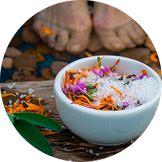Magnesium is among the most essential minerals for human health, playing a pivotal role in over 300 bodily processes. From sleep to energy, you need to give your body plenty of magnesium to feel and perform your best on a daily basis.
But not all magnesium is created equal, and one of the most common debates we see is which is better: magnesium taurate or glycinate. We’re here to get to the bottom of it in this comparison of magnesium taurate vs glycinate.
Each has its unique characteristics. Magnesium taurate could support heart and nerve function, while magnesium glycinate has been linked to relaxation and sleep, along with overall restlessness. But what if we told you it wasn’t a matter of magnesium glycinate vs taurate?
If you really want the best form of magnesium, look no further than magnesium chloride. It’s the most bioavailable form when used topically so your body gets maximum benefit with minimal side effects. It’s the form we use in our magnesium bath soak recipes at Flewd Stresscare.
Learn more about magnesium glycinate and taurate below, or save yourself the time and hassle and just give your body what it needs more at Flewd Stresscare today!
| Magnesium Taurate | Magnesium Glycinate | Magnesium Chloride in Flewd Bath Soaks | |
|---|---|---|---|
| Primary Benefit | Supports heart rhythm and cardiovascular health | Reduces anxiety and promotes relaxation | Broad support: stress, hormones, inflammation, nervous system, recovery |
| Best Use Case | Heart palpitations, blood pressure support, nervous system regulation | Chronic stress, anxiety, light sleep | Burnout, muscle pain, hormonal imbalance, fatigue, insomnia, and more |
| Absorption | Oral only | Oral only | Transdermal or oral |
| Bioavailability | Moderate | Moderate | High – avoids digestive system entirely |
| Side Effects | Loose stool or stomach discomfort | Rare mild digestive upset | Occasional tingling |
What is Magnesium Taurate?
This form of magnesium features taurine, an amino acid known for supporting cardiovascular function and helping regulate neurotransmitters in the brain. That’s why magnesium taurate is used by people looking to support heart health, reduce blood pressure, or manage symptoms related to stress and anxiety.
Taurine itself brings calming effects to your self-care ritual, and plays a pivotal role in healthy electrical activity in the heart. Pair it with magnesium and you have a dynamic duo for muscle relaxation, nerve signaling, and energy production.
Some people also turn to magnesium taurate for help with migraines, blood sugar regulation, or high blood pressure, but we don’t have a ton of research on these specific applications. It’s mostly anecdotal evidence.
Magnesium taurine can be helpful for mental clarity and emotional stability as well, since it’s able to cross the blood-brain barrier so efficiently. But like most forms of magnesium, it’s not without its downsides.
You’re getting fairly low elemental magnesium per dose, which means you need to compensate with a higher dose to meet your daily magnesium needs. This can lead to digestive discomfort if you’re taking magnesium pills or powder.
It’s also important to note this is not the ideal choice for your bedtime regimen. So which magnesium is best for sleep? We’ll get to magnesium chloride in a little bit. For now, though, let’s look at the other half of our magnesium taurate vs glycinate comparison.
What is Magnesium Glycinate?
Similar to magnesium taurate, this form brings its own amino acid into the equation: in this case, glycine. It’s a calming amino acid that helps keep your nervous system balanced, supports a healthier inflammatory response, and could promote better sleep quality.
So, it’s no surprise people turn to magnesium glycinate for managing anxiety, muscle tension, or insomnia. How does it work, though? Much of it can be attributed specifically to the glycine content.
This amino acid regulates GABA activity in the brain, a neurotransmitter that helps create a sense of calm in the body. Pair it with magnesium, which is already a calming mineral, and you get a supplement that eases you into a deep state of relaxation.
Many people prefer magnesium glycinate because it doesn’t cause digestive upset or loose stools, which can happen with some other forms. It’s also commonly used to support recovery after stress, physical exertion, or emotional overwhelm.
Again, though, magnesium glycinate has a few flaws you need to be aware of before adding it to your regimen. Any form of oral magnesium has the potential to cause uncomfortable side effects like bloating, cramping, or loose stools. That’s why we always advocate for topical magnesium,
We’ve written a lot about this particular form of magnesium because it’s so popular. Our blog has similar resources on magnesium chloride vs glycinate and magnesium glycinate vs threonate. But today’s conversation is on magnesium taurate vs glycinate - so let’s get into it!
Magnesium Taurate vs Glycinate: Key Differences to Consider
There’s no question you need to be supplementing with magnesium. But how you go about it can influence results, both good and bad. Some forms of magnesium are notorious for causing more side effects than benefits.
Fortunately, you don’t have to worry about that with magnesium glycinate vs taurate. These two forms are known for being relatively gentle and fairly effective for their intended uses.
They share a commonality in that each binds with an amino acid, but as you’ll see below, that’s where the similarities end and the differences between magnesium taurate vs glycinate begin.
Cardiovascular System vs Nervous System Support
The two amino acids work with different systems in the body - one in your cardiovascular system, the other in your nervous system. That distinction shapes the effects each brings to your self-care ritual.
Magnesium taurate can support heart health as taurine itself is known for regulating blood pressure and cardiovascular function. It’s used often by those suffering from palpitations or mild arrhythmia.
On the other hand, the glycine component in magnesium glycinate plays a role in calming neurotransmitters, making it a go-to option for managing stress, anxiety, or tension. It’s used regularly in the context of mood support or light sleep trouble.
Which Helps You Relax Deeper for Better Sleep?
One of the most common uses for magnesium in the general sense is sleep support. So which is better, magnesium taurate or glycinate for sleep? Unfortunately, neither is necessarily ideal.
Now, there are indirect links to sleep for magnesium taurate vs glycinate. For instance, glycine can help the nervous system wind down to set the stage for a better night’s sleep. Taurine may support sleep through its effect on the cardiovascular system, easing a tense, restless body.
But at the end of the day, this is the biggest draw for other forms, like magnesium chloride.
Bioavailability and Absorption Differences
Bioavailability speaks to how much of what you give your body it’s actually able to use, and how much gets excreted as waste. It’s an efficiency thing.
It matters because 1) high-quality magnesium supplements aren’t cheap and 2) low bioavailability means bigger doses (and side effects come with bigger doses). So which is better, magnesium taurate or glycinate, from an absorption perspective?
Both taurate and glycinate are considered more bioavailable than basic forms like magnesium oxide. Glycinate is particularly well absorbed and tends to be gentle on the gut. That said, even the best absorption through the digestive tract still faces limitations.
There are factors to consider like gut health, other nutrients consumed at the same time, and your unique metabolism. Ultimately, we advocate for topical magnesium because it leads to higher bioavailability with fewer side effects. Speaking of side effects…
Digestive Impact and Tolerance
One of the reasons glycinate is so widely recommended is its digestive tolerability. It’s less likely to cause loose stools compared to many other magnesium forms. Taurate is generally well tolerated too, but some users do report mild bloating or discomfort at higher doses.
Still, both forms can cause issues for those with very sensitive digestive systems. The only way to avoid this issue altogether is to avoid oral magnesium supplements and stick with a transdermal solution, like our stress relief bath soak formulations.
Can You Take Magnesium Taurate and Glycinate Together?
You can see the role each plays in human health by comparing magnesium glycinate vs taurate - but what if it wasn’t a matter of one or the other? Can you take magnesium taurate and glycinate together for the best of both worlds?
Technically, yes - whether you should or not is another story, though. Both are chelated forms of magnesium (they’re bound to amino acids). Taking them together is likely safe and might offer more well-rounded benefits if you’re trying to support both heart and nervous system health.
That said, combining them means you’re doubling up on total magnesium intake. The more magnesium you take (especially orally), the more likely digestive discomfort becomes. We recommend sticking with one or the other - or better yet, opt for a BETTER form of magnesium!
So Which is Better, Magnesium Taurate or Glycinate?
We hope this comparison of magnesium taurate vs glycinate has left you feeling clear in which has the edge. It really comes down to your specific needs.
Taurate may be more appropriate if you’re looking to support heart rhythm and blood pressure alongside rest. Glycinate could be better if your priority is easing stress or calming your mind before bed.
But here’s the thing: neither is ideal if you’re concern is deep, consistent, and restorative sleep. Or, maybe you’re looking to supercharge recovery rates, manage the stress of everyday life, AND avoid side effects at the same time.
That’s where magnesium chloride comes in.
Why Magnesium Chloride is Better Than Both Magnesium Taurate vs Glycinate
Magnesium chloride offers something magnesium glycinate and taurate can’t: efficient, full-body absorption without relying on digestion. This highly bioavailable form of magnesium dissolves easily in water and absorbs well through the skin, so you can use transdermal uptake instead.
That means you bypass the gut entirely and give your body access to the magnesium it needs without risking stomach discomfort or absorption issues.
It also means the vital mineral is spread uniformly throughout your body as you soak it up in a bathtub! Or, you can find magnesium chloride balms and get more targeted in how you apply it.
At any rate, the benefits of this form are well-documented. It’s used to ease muscle tension, promote deeper sleep, and calm the nervous system. It’s also ideal for people with compromised digestion or sensitive stomachs.
It’s the #1 epsom salt alternative in the world for a reason. So, how do you harness its therapeutic potential in your own self-care ritual? From our muscle bath soak to our anxiety bath soak, Flewd Stresscare makes it effortless.
Feel the Difference Firsthand With Flewd Stresscare!
Our mission is to make science-backed, nutrient-rich self-care simple and deeply effective. Our treatments help your body restore and rebalance itself naturally.
All our recipes start with the most bioavailable magnesium chloride - it’s the best magnesium for stress, sleep, aches, the list goes on and on. Then, we bring complementary vitamins, nootropics, and other ingredients to round out the formulations for a specific goal:
- Ache Erasing Soak: Includes Vitamins C & D, and omega-3s to ease inflammation and muscle tension. Scented with mandarin, clementine, and blood orange.
- Anxiety Destroying Soak: B-complex vitamins, and zinc help calm nervous system overload. Smells like a tropical coastline: lime rind, warm sea salt, and soft florals.
- Insomnia Ending Soak: Added vitamins A & E, and L-carnitine to support circadian rhythm and deeper rest. Bright, crisp yuzu with a soft floral finish.
- Sads Smashing Soak: B3, B6, and nootropic lithium help regulate serotonin and emotional balance. You’ll smell desert rain: green, minty, and woody.
- Rage Squashing Soak: Chromium and B12 help reduce cortisol spikes and emotional reactivity. Earthy blend of jasmine, pine, leather, and spice.
- Panic Crushing Soak: Boron, and omega-3s support hormone balance and muscle calm. Scented with soft floral, warm spice, and grounding wood notes.
The ingredients are 99% natural, vegan, biodegradable, and non-toxic so you never have to worry about nasties. The soaks are so easy to use, too. Dump a pouch in your tub and chill for 15-30 minutes. Use them 2-3 times a week, and you get stress-busting benefits for up to 5 days.
Don’t compromise with magnesium glycinate and taurate. Upgrade to a solution that actually moves the needle in how you feel at Flewd Stresscare today!
“I LOVE THESE THINGS SO MUCH!!!!!!! I cannot say enough about them! I'm not usually a bath person and get bored after five minutes but I will stay in these foreverrrrrr because they honestly feel that good! Highly recommend.” - Nicole
“Use these several times a week. As someone with chronic health issues it’s nice having a hot bath and going straight to sleep after.” - Christina
“These bath soaks remind me of the salty ocean, combined with the relaxation of reading a good book in the sun. I love them and can't stay away! I even got my husband to try one!” - Emily
Wrapping Up Our Comparison of Magnesium Glycinate vs Taurate
Both magnesium taurate vs glycinate offer specific benefits, but they aren’t without limitations. Bioavailability, absorption, and digestive tolerance can vary, and for many people, neither form delivers the full-body support they’re looking for.
That’s why we lean on magnesium chloride, especially in transdermal form, for deeper relaxation, better absorption, and fewer side effects. We invite you to do the same. Discover the Flewd formula your body’s been missing today!
























































